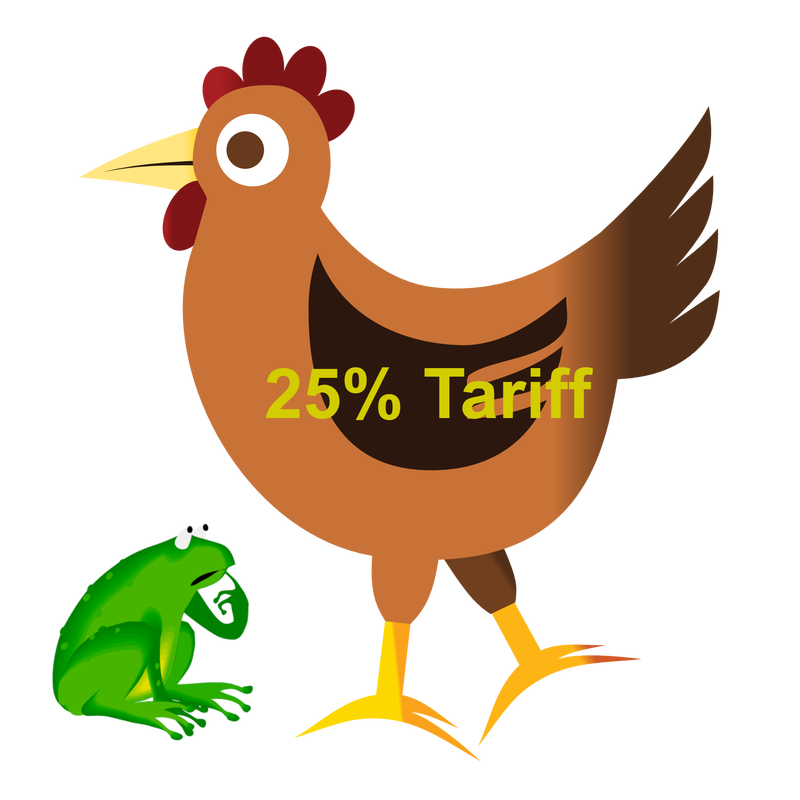The Chicken tax is a 25% tariff (tax) originally imposed on brandy, dextrin, potato starch, and light trucks imported into the United States from other countries. President Lyndon Johnson imposed that tariff in 1963 after a similar tariff was imposed by West Germany and France on chicken meat that was imported from the US. The tax was lifted on brandy, dextrin, and potato starch years ago, but still remains on imported light-duty trucks and vans. It is, of course, there to protect the interests of US automakers. As a result, major automakers have found a few very creative ways to circumvent the tax that's still in effect today.
So just how did The Chicken War get started? With the fear of a nuclear Armageddon still fresh in everyone's minds after the 1962 Cuban Missile Crisis, The Chicken War "played out during the height of the worldwide Cold War tensions. The history of the Chicken tax actually started back in the 1950's. Agricultural production in Europe was still low post-World War II. At the same time, US chicken production was steadily increasing. Chicken was scare and very expensive in Germany at that time. While the price of chicken at the grocery stores in the US was at an all-time low due to an increase in availability...supply and demand. With enough chicken to go around..."A chicken in every pot"...there was a surplus that could be exported to Europe. And the Europeans were more than happy to buy it. By 1961, the consumption of chicken in West Germany alone had increased by 23% because of imported American chicken. European governments began accusing the US of trying to corner the chicken market and forcing their local chicken producers out of business. This was the beginning of the Chicken War. But that's not the end of the story.
Late in 1961 Germany and France, along with other European countries, imposed stiff tariffs and price controls on US chicken being imported. By early 1963, US chicken farmers were complaining that sales of their product were dropping by at least 25% because of the European tariffs. Through much of 1963, US and European diplomats tried to come to an agreement on chicken and tariffs, but all attempts failed.
"With festering animosities and fear of the Cold War" influencing politics, Senator William Fullbright of the US gave an impassioned address at NATO regarding trade sanctions and US chicken. He finally threatened to withdraw troops from NATO over the issue. German Chancellor Konrad Adenauer recalled in his memoir that over half of his correspondence with US President John F. Kennedy had been about chicken and not a potential for nuclear holocaust. All I can say is, it's a good thing Twitter was around in those days!
At the same time all this was going on, the US auto industry was having their own trade crisis with more and more foreign cars being imported. In the early 1960's America's love affair with the VW Beetle was in full swing. Things got so bad with American auto company that they threatened a strike on all US auto production just before the presidential election of 1964. President Johnson appeased the auto workers by adding imported light trucks to the list of items covered by the Chicken Tax. The US has rescinded the tax on everything else but still kept the tariff on light-duty trucks and vans.
Even in international trade, there's a will and a way to make a profit. In 1972 Ford and Chevrolet discovered the "chassis cab" loophole which allowed for truck cabs to be imported at a 4% tax rather than the 25%. Once here, the auto manufacturers simply added the bed of the truck. President Jimmy Carter in 1980 closed the chassis cab loophole. Another "means to an end" example come from the German automaker Mercedes-Benz. They ship its Sprinter utility van to the US as parts and the vehicle gets assembled her. Not only do they get to by-pass the Chicken Tax this way, they also get to boast that their vans are "made in America."
The Chicken War has come and gone but the Chicken Tax remains after all these years. It begs the question, which came first, the chicken (tax) or the egg?
Until tomorrow, I wish you all PEACE.

 RSS Feed
RSS Feed